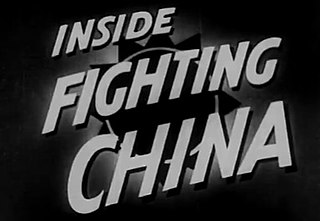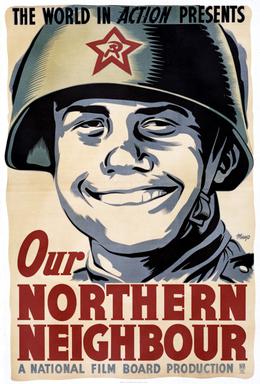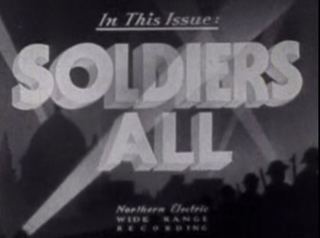Canada Carries On was a series of short films by the National Film Board of Canada which ran from 1940 to 1959. The series was created as morale-boosting propaganda films during the Second World War. With the end of the war, the series lost its financial backing from the Wartime Information Board, but continued as an NFB series of theatrical shorts that included newsreels as well as animated shorts.
The World in Action was a monthly series of propaganda films from the National Film Board of Canada (NFB), created to boost morale and show the Allied war effort during the Second World War.

Inside Fighting China is a 1941 22-minute Canadian short documentary film produced by the National Film Board of Canada for distribution by United Artists, as part of the wartime The World in Action series. The film documents China's resistance to Japan's invasion during the Second World War. Inside Fighting China is directed by Stuart Legg, and narrated by Lorne Greene. The film's French version title is La Chine sous les armes.

Now – The Peace is a film produced and directed in 1945 by Stuart Legg for the National Film Board of Canada series The World in Action, with unaccredited narration by Lorne Greene. Over its nearly 21-minute running time, circumstances during the immediate postwar period following the Second World War, leading to the formation of the United Nations are discussed.

Flight 6 is a 1944 Canadian documentary film produced by the National Film Board of Canada and directed and primarily photographed by Sydney Newman. The film is part of the Canada Carries On series, which ran from 1940 to 1959. Newman was also the executive producer for the series. Many of the documentaries were created as morale boosting propaganda films during the Second World War.

Ferry Pilot is a film produced in 1942 by Stuart Legg and Ross McLean for the National Film Board of Canada series The World in Action, in cooperation with the United Kingdom Ministry of Information and the Crown Film Unit. The film has an unaccredited narration by broadcaster Lorne Greene.

Wings of a Continent is a 1941 Canadian short documentary film, part of the wartime Canada Carries On series of short films by the National Film Board of Canada, produced for the Office of Public Information. The film was directed by Raymond Spottiswoode—father of filmmaker Roger Spottiswoode—written and produced by Stuart Legg and narrated by Lorne Greene.

Atlantic Patrol is a 1940 Canadian short documentary film, part of the Canada Carries On series of short films by the National Film Board of Canada, produced for the Office of Public Information.

Our Northern Neighbour is a film produced in 1944 by Stuart Legg and directed by Tom Daly for the National Film Board of Canada series The World in Action. The film is narrated by broadcaster Lorne Greene.

Everywhere in the World is a 16-minute 1941 Canadian documentary film about the contributions of the United States and Commonwealth countries to the Allied war effort. The film was made by the National Film Board of Canada (NFB) as part of the wartime Canada Carries On series. It was produced by Stuart Legg. The film's French version title was Partout au monde.

The Home Front is a 10-minute 1940 Canadian documentary film, made by the National Film Board of Canada (NFB) as part of the wartime Canada Carries On series. The film was produced and directed by Stanley Hawes.

Inside Fighting Canada is an 11-minute 1942 Canadian documentary film, made by the National Film Board of Canada (NFB) as part of the wartime Canada Carries On series. The film, written and directed by Jane Marsh and produced by James Beveridge, was an account of the Canadian military during the Second World War. The film's French version is titled Canada en guerre.

The Battle for Oil is a 19-minute 1942 Canadian documentary film, made by the National Film Board of Canada (NFB) as part of the wartime Canada Carries On series. The film was produced by Raymond Spottiswoode and directed and edited by Stuart Legg.The Battle for Oil describes the strategic value of oil in modern warfare. The film's French version title was La Bataille du pétrole.

Letter from Aldershot is a nine-minute 1940 Canadian documentary film, made by the National Film Board of Canada (NFB) as part of the wartime Canada Carries On series. The film was directed by John Taylor and produced by Stuart Legg.

Letter from Camp Borden is a 17-minute 1941 Canadian documentary film, made by the National Film Board of Canada (NFB) as part of the wartime Canada Carries On series. The film was directed by Raymond Spottiswoode and produced by Stuart Legg. Letter from Camp Borden chronicles the experiences in 1941 of a number of soldiers training at the Canadian Army's Camp Borden during wartime.

Soldiers All is a 20-minute 1941 Canadian documentary film, made by the National Film Board of Canada as part of the wartime Canada Carries On series. The film was directed and produced by Stuart Legg. Soldiers All describes the experiences in 1941 of soldiers, airmen and sailors in Great Britain and Canada during wartime. The film's French version title is Frères d'armes.

The Gates of Italy is a 21-minute 1943 Canadian documentary film, made by the National Film Board of Canada as part of both the wartime Canada Carries On and The World in Action series. The film was written, directed and produced by Stuart Legg and Tom Daly. The Gates of Italy describes the last days of Benito Mussolini's rule over Italy in 1943 during the Second World War.

Trans-Canada Express is a 20-minute 1944 Canadian documentary film, made by the National Film Board of Canada (NFB) as part of the World War II Canada Carries On series. The film was produced by Sydney Newman and directed by Stanley Hawes. Trans-Canada Express documents the importance of the railroad in Canada, emphasizing the use of rail transport during World War II. The film's French version title is D'un océan à l'autre.

Back to Jobs is a nine-minute 1945 Canadian documentary film, made by the National Film Board of Canada (NFB) as part of the postwar Canada Carries On series. The film describes soldiers in the Second World War returning home and back to a civilian life. The French version title of Back to Jobs is Nos soldats reviennent .

The War for Men's Minds is a 21-minute 1943 Canadian documentary film, made by the National Film Board of Canada (NFB) as part of the wartime The World in Action series. The film was produced by Stuart Legg. The film describes the impact of propaganda from the Axis powers in 1943, during the Second World War. The French version title is À la conquête de l'esprit humain.


















